Advance CTE and ECMC Foundation are excited to introduce the Fellows of the third cohort of The Postsecondary State Career Technical Education (CTE) Leaders Fellowship at Advance CTE—Sponsored by ECMC Foundation. The Advance CTE — ECMCF Fellows include representation across multiple demographic categories reflecting the Fellowship’s goal of intentionally building a postsecondary leadership pipeline for underserved populations in Career Technical Education (CTE) that closes racial representation gaps and removes equity barriers to postsecondary leadership advancement.
Over the next few days, this blog series will introduce each Fellow participating in the third cohort of emerging leaders from across 16 states and one U.S. territory.
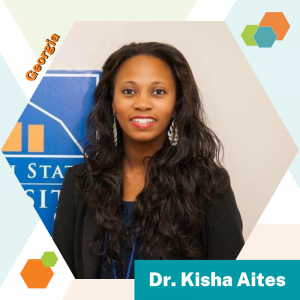 Dr. Kisha Aites serves as the interim department chair/associate professor of engineering technology education in the College of Education at Savannah State University. She holds degrees in technology education from North Carolina A&T State University and a doctorate degree in workforce education from Penn State. Dr. Aites was part of the 2022–2023 USG Executive Leadership Institute and served as Vice Chair of Faculty Senate from 2019-2021. In 2015, she served as editor for the publication Introduction to Critical Issues in Education and was honored by the Georgia Association for Engineering & Technology Education in 2015 and 2016. She has traveled globally, including to Ghana (Fulbright-Hays Fellow) in 2016 and China (GA Education Delegation) in 2017, to explore and promote educational and cultural exchanges. Dr. Aites is dedicated to addressing equity issues in engineering technology, workforce development, and critical issues in education.
Dr. Kisha Aites serves as the interim department chair/associate professor of engineering technology education in the College of Education at Savannah State University. She holds degrees in technology education from North Carolina A&T State University and a doctorate degree in workforce education from Penn State. Dr. Aites was part of the 2022–2023 USG Executive Leadership Institute and served as Vice Chair of Faculty Senate from 2019-2021. In 2015, she served as editor for the publication Introduction to Critical Issues in Education and was honored by the Georgia Association for Engineering & Technology Education in 2015 and 2016. She has traveled globally, including to Ghana (Fulbright-Hays Fellow) in 2016 and China (GA Education Delegation) in 2017, to explore and promote educational and cultural exchanges. Dr. Aites is dedicated to addressing equity issues in engineering technology, workforce development, and critical issues in education.
 NiñaFe Awong is an experienced CTE professional with over 19 years of experience in workforce development, educational leadership, and project management. NiñaFe’s primary mission has been to align CTE programs with industry needs. She has developed and implemented robust statewide initiatives, policies, and programs that drive student achievement and prepare learners for high-wage, high-skill, and in-demand careers. NiñaFe has also effectively managed federal and state funding, while successfully navigating complex legislative and regulatory landscapes, ensuring compliance and delivering measurable outcomes. NiñaFe has helped to refocus organizational lenses to recognize and reprioritize CTE at local and state levels. As a product of CTE education, she strongly advocates student-centered learning, supports instructor development, and believes in forging strategic partnerships that enrich educational experiences. NiñaFe is passionate about removing barriers and creating opportunities for learners to thrive and excel in their chosen careers.
NiñaFe Awong is an experienced CTE professional with over 19 years of experience in workforce development, educational leadership, and project management. NiñaFe’s primary mission has been to align CTE programs with industry needs. She has developed and implemented robust statewide initiatives, policies, and programs that drive student achievement and prepare learners for high-wage, high-skill, and in-demand careers. NiñaFe has also effectively managed federal and state funding, while successfully navigating complex legislative and regulatory landscapes, ensuring compliance and delivering measurable outcomes. NiñaFe has helped to refocus organizational lenses to recognize and reprioritize CTE at local and state levels. As a product of CTE education, she strongly advocates student-centered learning, supports instructor development, and believes in forging strategic partnerships that enrich educational experiences. NiñaFe is passionate about removing barriers and creating opportunities for learners to thrive and excel in their chosen careers.
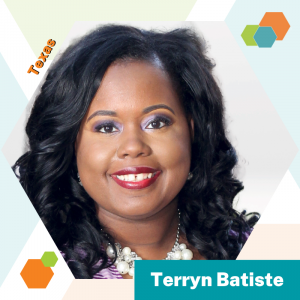 Terryn Batiste leadership of administration and daily operations of third-party accreditations, along with industry-recognized credentials. Her career includes working in the areas of public policy, enrollment management, accreditation, and compliance. Batiste holds two degrees from Southern University and A&M College — a Bachelor of Arts degree with honors in mass communications and a Master of Public Administration from the Nelson Mandela School of Public Policy. She holds a project management professional (PMP) certification from the Project Management Institute and a Developing a Curriculum (DACUM) certification from The Ohio State University. She is married with two children (boy/girl twins).
Terryn Batiste leadership of administration and daily operations of third-party accreditations, along with industry-recognized credentials. Her career includes working in the areas of public policy, enrollment management, accreditation, and compliance. Batiste holds two degrees from Southern University and A&M College — a Bachelor of Arts degree with honors in mass communications and a Master of Public Administration from the Nelson Mandela School of Public Policy. She holds a project management professional (PMP) certification from the Project Management Institute and a Developing a Curriculum (DACUM) certification from The Ohio State University. She is married with two children (boy/girl twins).
 Renee Blackshear is an esteemed professor specializing in computer networking at Texas State Technical College. With degrees in networking, e-commerce and security, her research focuses on the security and scalability of network infrastructures, addressing critical issues in data transmission and internet protocols. Ms. Blackshear’s career spans over 15 years, during which she has continuously helped develop curriculum for emerging technology and has presented at a number of national conferences. Her passion for teaching extends beyond the classroom, where she mentors students and collaborates with industry experts to innovate network technologies. Recognized for her expertise in network design and optimization, she actively contributes to shaping the next generation of networking professionals. Ms. Blackshear’s commitment to bridging theory with practical application has earned her accolades for fostering a dynamic learning environment and preparing students for the evolving challenges of the digital age.
Renee Blackshear is an esteemed professor specializing in computer networking at Texas State Technical College. With degrees in networking, e-commerce and security, her research focuses on the security and scalability of network infrastructures, addressing critical issues in data transmission and internet protocols. Ms. Blackshear’s career spans over 15 years, during which she has continuously helped develop curriculum for emerging technology and has presented at a number of national conferences. Her passion for teaching extends beyond the classroom, where she mentors students and collaborates with industry experts to innovate network technologies. Recognized for her expertise in network design and optimization, she actively contributes to shaping the next generation of networking professionals. Ms. Blackshear’s commitment to bridging theory with practical application has earned her accolades for fostering a dynamic learning environment and preparing students for the evolving challenges of the digital age.
 Ignacio Chaparro is a Pre K-16 equity-focused educational professional with a robust background in leadership, systems building, and strategic policy development and implementation. He is currently pursuing his doctorate in educational leadership and policy studies at Boston University. Ignacio also holds a Master of Public Administration from Northeastern University, and a Bachelor of Arts in Political Science from the University of Massachusetts Boston. As the College and Career Readiness & Pathways Liaison at the Massachusetts Department of Elementary and Secondary Education (DESE), Ignacio provides direct support to districts across the state with implementation of high-quality college and career pathways. His previous roles include serving as the director of equity and accountability at Boston Public Schools, and as project specialist for the Massachusetts Department of Higher Education.
Ignacio Chaparro is a Pre K-16 equity-focused educational professional with a robust background in leadership, systems building, and strategic policy development and implementation. He is currently pursuing his doctorate in educational leadership and policy studies at Boston University. Ignacio also holds a Master of Public Administration from Northeastern University, and a Bachelor of Arts in Political Science from the University of Massachusetts Boston. As the College and Career Readiness & Pathways Liaison at the Massachusetts Department of Elementary and Secondary Education (DESE), Ignacio provides direct support to districts across the state with implementation of high-quality college and career pathways. His previous roles include serving as the director of equity and accountability at Boston Public Schools, and as project specialist for the Massachusetts Department of Higher Education.
To learn more about the Fellowship, the Fellows of Cohort 3, and the alumni of the Fellowship, please visit https://careertech.org/what-we-do/initiatives/postsecondary-state-cte-leaders-fellowship/


 In the aftermath of the coronavirus pandemic, the strains on the healthcare system continue to be felt, with
In the aftermath of the coronavirus pandemic, the strains on the healthcare system continue to be felt, with Florida
Florida  In Washington,
In Washington,  Wisconsin
Wisconsin  To see more policy trends and access our policy tracker, check out our
To see more policy trends and access our policy tracker, check out our 
 Once you’ve done your research and understand the job landscape in your area, it’s time to share that information and vision with your fellow educators, administrators, and Departments of Education. Gather testimonials from your past learners. Talk to employers in your community about learners they’ve worked with. Find ways to get others on board and see the impact of CTE in your school, district, and state.
Once you’ve done your research and understand the job landscape in your area, it’s time to share that information and vision with your fellow educators, administrators, and Departments of Education. Gather testimonials from your past learners. Talk to employers in your community about learners they’ve worked with. Find ways to get others on board and see the impact of CTE in your school, district, and state.  Hello! My name is Jessica (Jessi) Maddox, and I am ecstatic to be a part of the Advance CTE team as a senior policy associate. In this role I will be working directly with the upcoming cohorts of the Opportunity Gap Analysis providing customized technical assistance and peer learning opportunities to participating states. I will also collaborate with team members to enhance Advance CTE’s state policy, equity, and data and research strategies by supporting state and local sites in designing and advancing high-quality and equitable career pathways.
Hello! My name is Jessica (Jessi) Maddox, and I am ecstatic to be a part of the Advance CTE team as a senior policy associate. In this role I will be working directly with the upcoming cohorts of the Opportunity Gap Analysis providing customized technical assistance and peer learning opportunities to participating states. I will also collaborate with team members to enhance Advance CTE’s state policy, equity, and data and research strategies by supporting state and local sites in designing and advancing high-quality and equitable career pathways.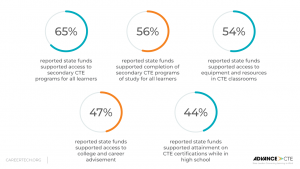

 Lawmakers in the House and the Senate continued to negotiate a path forward on FY24 appropriations this week as two funding deadlines drew closer. As
Lawmakers in the House and the Senate continued to negotiate a path forward on FY24 appropriations this week as two funding deadlines drew closer. As  Tell me more about your journey to the Fellowship.
Tell me more about your journey to the Fellowship.
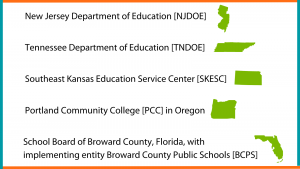
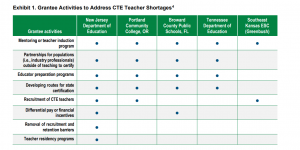
 Kayla Brossett, Louisiana
Kayla Brossett, Louisiana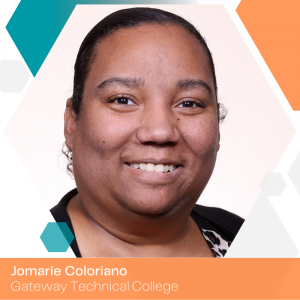 Jomarie Coloriano, Wisconsin
Jomarie Coloriano, Wisconsin 